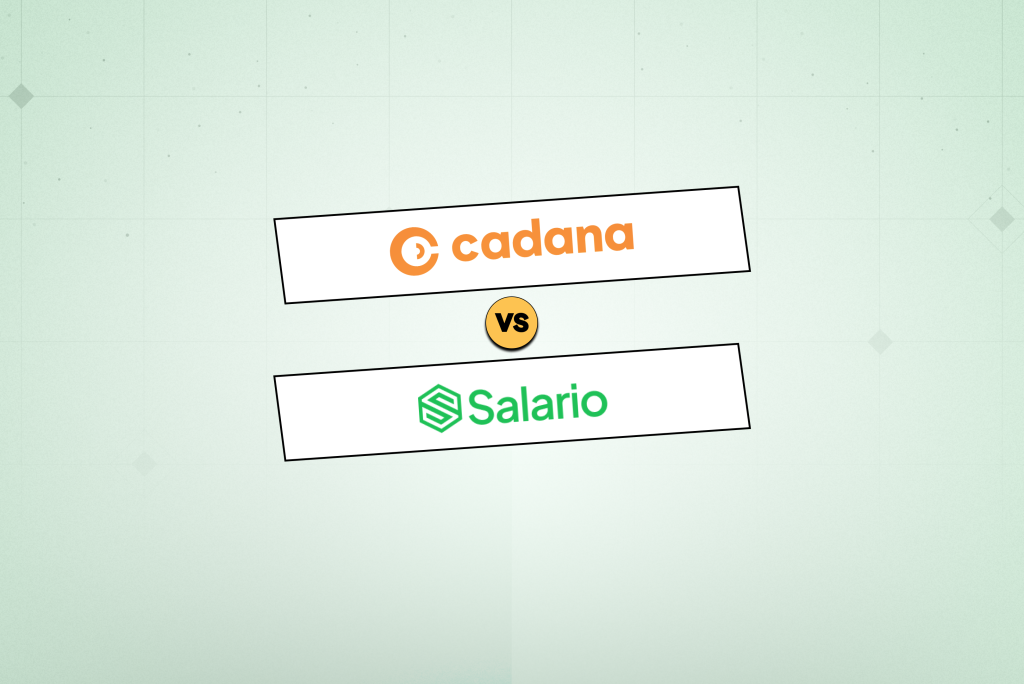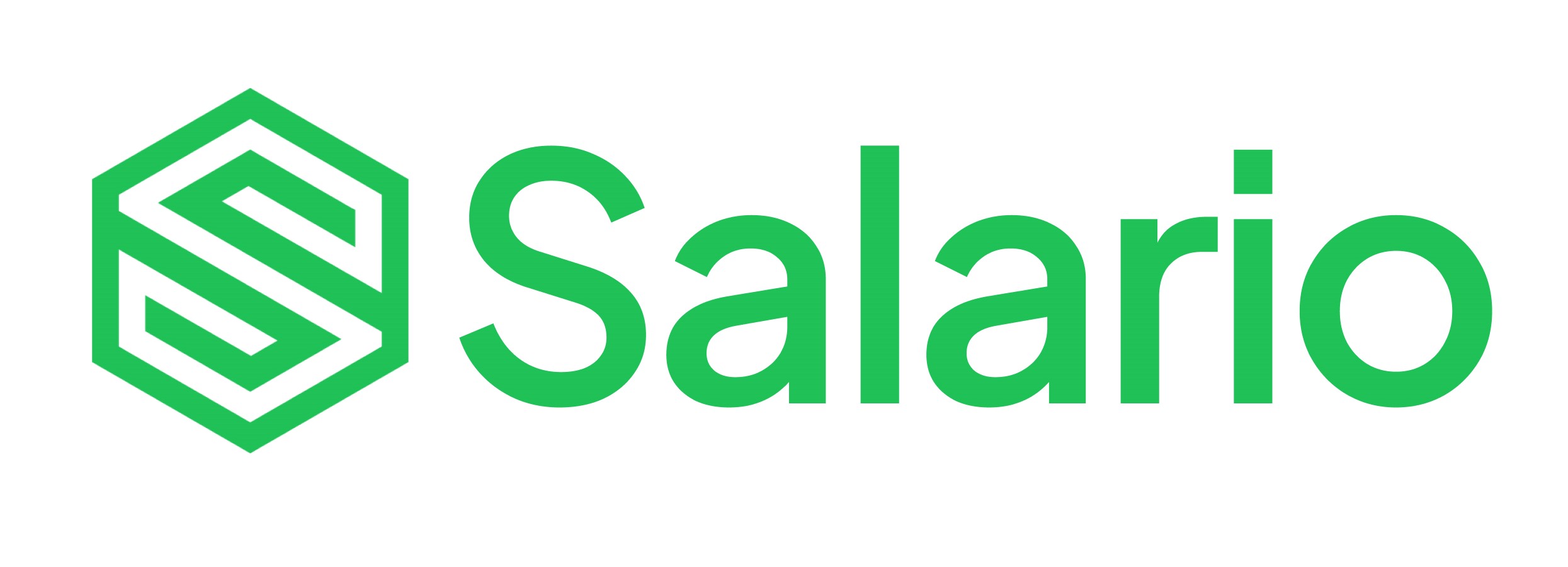
Choosing the right payroll platform isn’t just about automation, it’s about finding a system that understands your business, region, and team’s needs. Both Cadana and Salario offer smart payroll solutions tailored for the African market, but they serve different types of businesses with different goals.
Cadana focuses heavily on payment infrastructure and cross-border payouts across Africa, positioning itself as a modern payroll rails provider. Salario, on the other hand, is more localized, specifically designed for Nigerian businesses seeking to simplify payroll, statutory deductions, and HR compliance without added complexity.
In this post, we’ll compare Cadana vs Salario amongst other similar solutions across key areas, including payroll functionality, compliance support, EOR services, and pricing, so you can choose the platform that best fits your team, growth strategy, and operational needs.
Cadana vs Salario: Payroll Capabilities
When it comes to payroll automation, both Cadana and Salario bring solid functionality to the table, but with different priorities.
Cadana

Cadana is primarily built around financial infrastructure, making it ideal for businesses looking to streamline payment processing and cross-border payouts across Africa. Its payroll engine integrates seamlessly with various wallets and banking systems, giving it strength in high-volume, pan-African salary disbursement. It’s especially well-suited for tech companies or platforms managing large contractor networks across multiple countries.
Salario
Salario, on the other hand, is purpose-built for Nigerian payroll compliance and administration. It offers automated salary calculations, multi-schedule payroll runs, payslip generation, and built-in support for statutory deductions like PAYE, NHF, and pensions. For businesses that need to run local payroll with full transparency and legal alignment, Salario removes the guesswork and the spreadsheets.
So while Cadana excels in speed and infrastructure, Salario leans into compliance, structure, and local relevance. If your focus is hiring and paying talent specifically in Nigeria with clear documentation and regulatory accuracy, Salario provides a more specialized experience.
Cadana vs Salario: Compliance and Security
In any payroll or HR system, compliance and data security are non-negotiables. Whether you’re paying remote teams or managing full-time employees, you need confidence that your platform keeps your business on the right side of local law, and your team’s data protected.
Cadana
Cadana approaches compliance primarily through its payments infrastructure. It ensures that funds are delivered efficiently, and offers some level of localized support for tax reporting in supported countries. However, its core strength lies in financial operations, not full statutory compliance. Businesses often combine Cadana with internal legal or HR expertise to comply with country-specific labor laws and remittance obligations.
Salario

Salario, in contrast, is built around Nigerian regulatory frameworks. It automates PAYE, pension, and NHF deductions; ensures timely remittance to statutory bodies; and generates payroll reports in formats compliant with Nigerian standards. For businesses hiring in Nigeria, this local-first approach significantly reduces the risk of errors or non-compliance penalties.
On the security front, both platforms are cloud-based and follow global standards for data protection. However, Salario’s focus on local compliance makes it a safer operational choice for businesses that want more than just payment processing. They want true peace of mind.
Cadana vs Salario: Ease of Use and Support Experience
Choosing a payroll platform isn’t just about features, it’s also about how easily your team can navigate the system and get help when it matters. In fast-paced work environments, clarity, onboarding, and support can be the difference between a smooth payroll run and a stressful month-end scramble.
Cadana
Cadana is known for its sleek interface and modern UX. It’s built with scalability in mind and offers a clean, developer-friendly experience, especially for startups and fintech teams who are already familiar with payment APIs and automation tools. However, businesses that require hands-on guidance or localised onboarding may find they need a bit more support navigating compliance nuances.
Salario
Salario, on the other hand, is specifically designed for Nigerian businesses, schools, and teams that lack in-house payroll specialists. Its interface is designed to simplify statutory payroll tasks, and onboarding is guided with local context in mind. The platform also offers responsive customer support based in Nigeria, making it easier to resolve issues tied to local regulation or workflow concerns.
So while Cadana delivers a polished, infrastructure-driven experience, Salario offers simplicity backed by context-aware support, a practical advantage for teams that value clear answers and local guidance.
Cadana vs Salario: Employer of Record
As global hiring becomes more common, Employer of Record (EOR) services have become essential for businesses seeking to hire talent in new markets without establishing local entities. EORs allow you to legally employ staff, manage payroll, and stay compliant, without the overhead of building a full local presence.
Cadana
Cadana focuses more on payroll infrastructure than full EOR offerings. While it enables smooth payment flows across Africa and offers basic tools for managing contractors, it doesn’t currently provide a formal EOR service for businesses that need to hire full-time employees compliantly in Nigeria. For companies that already have legal support or use multiple platforms, this may not be a deal-breaker, but it does leave a gap for those seeking end-to-end hiring support.
Salario
Salario, by contrast, now offers dedicated Employer of Record services in Nigeria. This means businesses can hire local talent without creating a Nigerian entity, while Salario handles employment contracts, payroll, statutory deductions, and compliance reporting. It’s especially valuable for foreign companies testing the Nigerian market, or local startups expanding fast without in-house HR or legal teams.
If you’re looking to hire Nigerian talent legally and efficiently, Salario’s EOR service offers a compliant, low-friction path to building a team, with the local knowledge and infrastructure to back it up.
Final Verdict – Cadana vs Salario: Which One Is Right for You?
Both Cadana and Salario offer valuable tools for managing payroll in Africa, but they serve slightly different priorities. Cadana excels in cross-border payments, payroll infrastructure, and supporting distributed teams, particularly for startups and tech companies operating across multiple African markets.
Salario, however, is the more focused choice for businesses operating within Nigeria or hiring Nigerian talent. Its deep integration with local compliance systems, responsive customer support, and now fully active Employer of Record service make it a strong all-in-one solution for the country’s HR, payroll, and statutory obligations.
If your goal is to simplify Nigerian payroll, reduce compliance risks, and have the option to hire legally through an EOR, Salario offers a more tailored experience, especially for businesses that value local context, clarity, and control.
The right choice depends on your structure. But if Nigeria is your core market, Salario is built with your business in mind. Book a demo to discover how well Salario can benefit your business.
